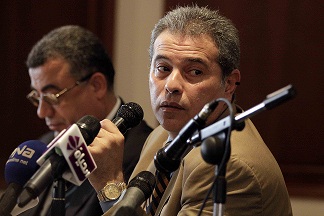CAIRO: As the 25 year-old emergency laws are planning to be lifted by the government, opposition groups, especially Kefaya, have expressed their hesitancy in support such an action. They argue that when the emergency laws are gone, the new anti-terrorism bill proposed by the government will be even worse.
“The emergency law should be repealed, George Ishaq, head of the Kefaya movement, argues. “But in its place should not be a law even more intrusive and destructive.
Prime Minister Ahmed Nazif announced last week that the government is planning on making the move to the anti-terrorism law soon. The emergency laws granted security forces sweeping powers to arrest and detain that many opponents of the government say would remain under the new law.
“We need to be judged by ordinary laws, not with the belief that we are all violent ‘terrorists’ that want to undermine the Egyptian state, Ishaq says. “They say things are changing and opening up, but with the passing of the new law, there is really nothing that will change.
Kefaya is the second largest opposition group, behind the Muslim Brotherhood. According to Ishaq, there are over 15,000 members of the organization, with millions in support of their actions.
Ishaq says that just last week in Port Said, the use of force under the auspices of the emergency law showed why the proposed anti-terrorism law would be similar. According to Kefaya, the government destroyed the houses of some 10 people in Port Said, claiming they were conducting activities against Egypt.
“Kefaya was there to help them in their boycott and protest of the government’s decision to demolish the homes, Ishaq says. “They [the government] argued that these people were a threat to Egypt and its security, but they were no more than citizens asking for a better way of life.
This is a blatant violation of rights, he says, and it is directly due to the overwhelming power that the emergency law has given to the executive. “The government says that there has never been any abuse of power as a result of the emergency law, Ishaq continues. “This is obviously a blatant lie, as we saw what these powers can do in Port Said.
The emergency laws were enacted in 1981, following the assassination of President Anwar Al-Sadat, and parliament has renewed the laws every three years since. It is due to expire in May, which has led the government to campaign for a more permanent law in the likeness of those passed by the United States and Britain in recent years.
Kefaya has already begun a mass campaign against any permanent anti-terrorism laws and hopes that they can continue to build their strength despite attempts to stifle their activity.
“This [government] is very strong, but we must continue to put pressure on them and insist that they have to help our people, Ishaq says. “We engage them in protests and demonstrations, although they are technically illegal.
Kefaya, an organization that gained momentum following last year’s Presidential election, is building a constituency aimed at breaking the power hold of the government.
“People don’t care about politics or democracy in this country, Ishaq argues. “Our main goal is to help people with real problems, like in Port Said. We do this to counter the government’s lack of effort with the people.
Although Kefaya has grown over the past year, there is much more work that needs to be done if they are to be seen by majority of the Egyptian population as a viable alternative to the government.
“We have to do more to make our name known, Ishaq says of Kefaya. “We must build a strategy for the future that will bring all groups together in opposition to the current stranglehold on power. It is time for us to make a revival and to those who say Kefaya is finished I tell them that we are just at the beginning.
Kefaya has supported efforts to help educate people about bird flu, freedom of the press and the abuse of judicial power over the past few months.
“People must be patient, Ishaq continues. “It takes years for change and if people demand immediate change then they will be too short sighted and will miss the opportunity to make real change effective and permanent.
The emergency laws and the subsequent anti-terrorism law will be a major step in the role Kefaya can have in affecting change, as their name purports, in this country. Ishaq is optimistic that the upcoming April conference to establish a plan for the coming years will be vital in establishing Kefaya as a viable option for the Egyptian people.
“We are going to get out there and show people we are not finished, Ishaq believes. “Little by little we are insisting that the Egyptian population is not finished and nothing can stop Egypt from remaining the way it is, not even the anti-terrorism law that is to be announced.


